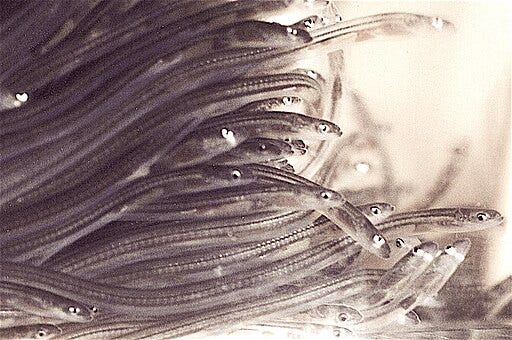Organised crime syndicates smuggling eels from Europe to Asia
An continent-spanning operation led to the seizure of more than 20 tonnes of the marine animal
More than 20 tonnes of glass eels were seized during a year-long operation targeting trafficking networks. Authorities made 26 arrests and carried out more than 16,000 inspections across Europe.
Eels are commonly eaten in countries across Europe and Asia, but their populations have been pushed to the brink by overfishing, pollution and climate change. This has created one of the world’s most valuable illegal wildlife trades with an estimated 100 tonnes smuggled out of the continent each year.
The European eel was listed as endangered in 2007. But that has not stopped the illegal traders.
The latest crackdown is yet more evidence of the presence of smugglers supplying Asian markets. According to authorities, organised crime groups spanning Europe and Asia catch the eels in fisheries and smuggle them to Asia where they are placed in farms and then sold globally as legitimate fish products.
Brazil: Police have charged 31 suspects with fraud and land-grabbing in connection with an allegedly criminal carbon credit scheme. An investigation linked two projects to illegal timber laundering after a mismatch was found between the declared amount of timber and the amount seen on satellite images. Carbon credits can be used by companies or individuals to “offset” emissions. (Mongabay)
Australia: A student has been fined $35,000 for attempting to smuggle more than 100 insects and spiders out of Australia. They included carabid beetles, multiple centipedes and banded huntsman spiders. The majority were regulated species native to Australia. It is unclear where the student had planned to travel too with the animals, which are now recovering in a specialist centre. (Government release)
India: Two endangered gibbons – one dead and one alive – were found in a checked suitcase at an airport in Mumbai. The animals, which were from Indonesia, were tiny with the surviving animal in a distressed state. The passenger had travelled from Malaysia via Thailand and had been given them by a wildlife trafficking syndicate to be delivered to India, authorities said. (CBS)
USA: The US will build a “blacklist” of foreign vessels suspected of engaging in IUU fishing, following the passing of a new bill by the Senate. The new law also requires authorities to develop new technologies for combatting illegal fishing, with a special focus on Chinese and Russian fleets. (Must Read Alaska)
Oman: Abalone fishing has been banned this year in Oman to protect dwindling stocks of the marine snails. Harvesting was allowed for a brief period last year, but has otherwise been banned since 2020. Annual catch has fallen to about a third of 2011 levels, according to the fisheries ministry, which said stocks are put under pressure by illegal fishing. (Muscat Daily)
Australia: Three Indonesians have been jailed and fined for fishing illegally in Australian waters. They are some of the 69 Indonesian fishers who have been prosecuted at the regional court in Darwin since the beginning of July. Australia says it is working with Indonesia to address illegal fishing and educate fishers. The three men were found with hundreds of kilograms of sea cucumber. (Seafood Source)
Brazil: Hundreds of dredges were dismantled in the Brazilian Amazon during an operation targeting illegal gold mining. According to Interpol, the 277 dredges represent $6.8m in illegal gold extraction. Total seizures as part of the operation led to a total economic impact into the hundreds of millions, authorities claimed. (Interpol)
India: A parrot which had been rescued from smugglers in February last year has been stolen from the zoo where it was being kept. Authorities are investigating and said the possibility of “insider involvement” cannot be ruled out. The theft emphasises the challenges of protecting rare species, even once they have been rescued. (Times of India)
Japan: Smugglers and souvenir hunters are putting endemic wildlife at risk in Japan’s Okinawa islands. A growing number of poaching cases is putting hermit crabs, turtles and other species found nowhere else under increasing pressure. The demand is overseas, with most traffickers captured planning to smuggle the animals elsewhere. (South China Morning Post)
Nigeria: New legislation in Nigeria – a hub of the illegal wildlife trade in Africa – would see offenders jailed for up to 10 years for smuggling products of endangered species. It also allows for fines of up to $8,300. The bill has been welcomed as filling gaps in the country’s legal framework, but some experts are sceptical as to how well it will be enforced. (Mongabay)
Thank you so much for reading Wild Crime. This is a fully reader-supported publication with no outside funding. Paid subscriptions make it possible for us to dig deeper and pursue investigations that take time and resources. But even if you’re reading for free, you’re helping to keep this work alive, and I’m grateful for that.
If you’d like to support Wild Crime further, consider becoming a paid subscriber or sharing this newsletter with someone who might find it interesting. Every bit of support makes a real difference.


